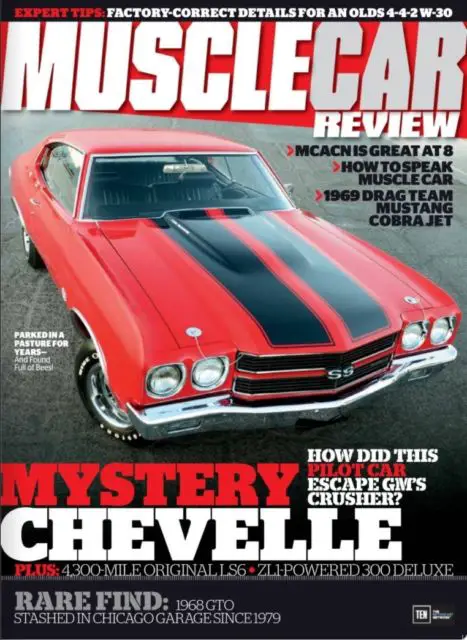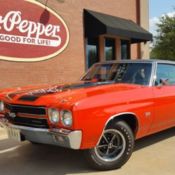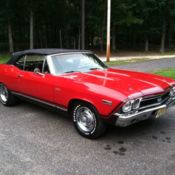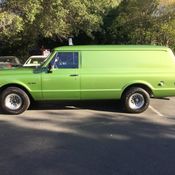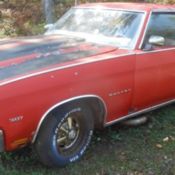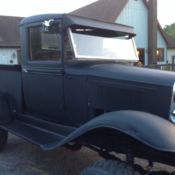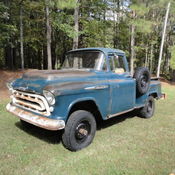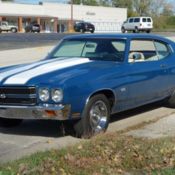1970 Chevrolet Chevelle 396 SS Pre-Production Assembly Prototype
| Condition: | Used |
| Make: | Chevrolet |
| Model: | Chevelle |
| SubModel: | SS |
| Type: | Coupe |
| Trim: | SS |
| Year: | 1970 |
| Mileage: | 999,999 |
| VIN: | F100042 |
| Color: | Red |
| Engine: | V8 396 |
| Cylinders: | 8 |
| Fuel: | Gasoline |
| Transmission: | Automatic |
| Drive type: | RWD |
| Interior color: | Black |
| Vehicle Title: | Clear |
| Item location: | Hutchinson, Kansas, United States |
| Extras |
| Listed by | Private seller |
Description of 1970 Chevrolet Chevelle SS |
|
F100042 "1970 396 SS Assembly Prototype" Cars For Sale - YouTube Video will open in a new window [isdntekvideo]A Once in a Generational opportunity to transfer custodial responsibilities and curatorship of F100042,"The 1970 396 SS Prototype". The only known surviving example of a coupe in the impressive and historically important prototype programs of General Motors that created the Chevrolet Chevelle. Standing entirely alone from a program that created the first working prototypes of the infamous 1970 Chevelle....it carries the distinction of being nationally recognized and personally documented by Pilot Car Registry. It not only possesses the vast majority of its prototype parts and a top tier ownership history spanning close to birth, but also carries the distinction of being authenticated in person by Pilot Car Registry. Personal viewing of this example can be done by appointment and is highly encouraged. Transportation of this priceless piece of General Motors history is included within the sale and includes a documentary film crew to capture the ownership transfer from the current owner to the new Sentinel. Payment will be handled via bank wire to the T.A. Lawson/Pilot Car Registry Irrevocable Trust prior to personal delivery by Pilot Car Registry. For personal viewing appointment, please contact us at pilotcarregistry@gmail.com or utilize the "Contact Us" tab at www.pilotcarregistry.com. Research Video of F100042 1970 Pre-Production SS 396 Chevelle Prototype | Cars For Sale - YouTube Video will open in a new window [isdntekvideo]In November of 2017, Pilot Car Registry was asked to authenticate and document F100042...a 1970 SS 396 Chevelle that was thought to be a Pre-Production Pilot for the 1970 model line. We had followed the national story on this particular car since we first viewed it at Sema in 2016. The Cranberry Red Coupe had been spotlighted in numerous magazines throughout its unveil, but the factory history was always speculated upon...not definitively proven. This peaked Pilot Car Registry's interest, because this is precisely the area of our Subject Matter Expertise. Since 2010, our organization had documented the factory history of over sixty Pilot Prototypes and our personal inspection protocol would finally answer the questions that had been raised throughout the hobby regarding this particular example. The current curator of F100042, David Harter, lived in Fort Wayne, Indiana...so, we pointed our volunteers northeast and set out to find the answers. I had read the national articles regarding the speculated factory origins of the car...but without professional involvement, the authors had left the question of the car's historical importance open to interpretation by the reader. Additionally, the car had been compared to two mid-stream general assembly line constructed LS6 Chevelles that had been documented as "Pilots" because of hand written notes on factory build sheets. This had caused an enormous amount of confusion and was the precise content of articles that our group had written for Muscle Car Review. General Motors Pilot Plant Assembly had a wide ranging General Motors Prototype Program. These test studies accomplished many simultaneous goals. Among these were engineering and feasibility, assembly time and fitment, and coordinating design engineers with the vendor network. If this doesn't seem complex enough already, these prototype studies and hand-built assembly programs worked together with several divisions for testing in a final evaluation phase. These divisions were Sales, both at the National Sales & Convention level, as well as, the local publicity levels... Engineering and Testing at the Milford Proving Grounds...Engineering Body of Design...and Maufacturing. In addition, many of these Prototypes were utilized by General Motors executives for daily transportation, allowing for personal evaluation by the leaders of their respective divisions prior to assembly line commencement. Sounds pretty complicated, huh? Well, it is....and it was. And this is precisely the reason that the car hobby has so many varying definitions of what a "Pilot" is. By definition, this term means "the first of something". This could be the testing of a changing drive-train in a pre-existing model, the subtle body line and interior updates from a model line upgrade in the upcoming year, or the complete and daunting task of creating an ENTIRELY new model in the first year of design and development. The confusion of the LS6 equipped 1970 Chevelles with build sheets from general assembly line production was easily rectified within our archives. These two mid-stream general production Chevelles were the beneficiaries of a Pilot Drivetrain program when the option of the 454 was introduced. With all of the pre-production testing of the entirity of the car already complete....Pilot Plant involvement in this changeover would be limited to the development on the drivetrain necessary for this new option. The Pilot Plant would supply the 454 and the necessary components for assembly in a prototype fashion, but the Installation and Time Studies were orchestrated on a general production assembly line utilizing mass manufactured automobiles. These general production assembly line Pilot activities are well understood, because of the existence of the build sheets....but we were in search of something far more elusive. Pilot Car Registry understands the historical importance of all General Motors "Pilot" activities, but our area of intense research is held within the Pre-Production Programs. These are programs that are truly prototypical in virtually every sense of the word. These automobiles are referred to as "Pilot Prototypes" and were predominately assembled in a hand built atmosphere.....one at a time until completion.....in consecutive vin number order....utilizing pre-production and prototype parts...carry over and prototype sheetmetal...and significant differences from their assembly line line general production vehicular counterparts. Although the most complex Pilot Prototype activities are encompassed within the pre-production development of an entirely new model line prior to the first year of release and sale, the pre-production development of generational model changes is historically monumental as well. And that was what we were attempting to authenticate. You would think that would be simple...but its not. Pilot Car Registry has a stringent protocol for authenticating and blessing these surviving examples. First of all, the automobile must meet the standards of being definitively Pre-Production. Second, it must be in possession of a substantial amount of prototypical assembly parts from its hand-built format. And finally, there must be a documented ownership chain that spans close to birth. Its a high bar, but the historical significance of these General Motors programs can not be compromised by illegitimate acceptance. With all this understood...the story of our research for F100042 begins after arrival by our team in Fort Wayne, Indiana. David and his lovely fiance', Crystal...met us the night before for dinner. David was understandably excited. I recognized his emotions right away. Here was a guy that loved cars...like all of us...but also had ventured outside his comfort zone to pursue saving and documenting a priceless piece of General Motors history. It hadn't started that way...he had bought the car to enjoy it, but when he quickly realized the significance during disassembly...he began a quest that strayed a long way from the simplistic nature of procuring and enjoying a antique automobile. Upon realization of the potential significance....he saved everything. He not only saved everything, he made every effort to reuse all of the restorable components. This was a guy after our own hearts...and the hearts of all Chevelle enthusiasts throughout the globe. In addition to restoring this example suitable for a coastal concours de elegance, he had documented the prior ownership chain as well. At that point, still professionally skeptical....our team began to share his excitement. The authentication process began the following morning. Four hours of extensive inspection that was documented utilizing still and video photography ensued. As I said before, our team has lengthy experience in documenting and authenticating Pilot Prototypes, but this example was special. F100042 was in possession of virtually every example of prototypical parts that we had experienced. Many of these parts are simply discarded when a car undergoes a lengthy restoration.....replaced with something that is shiny and new. These reproduction parts take the place of priceless original gems that can never be replaced.....and portions of the historical relevance are lost forever. From its humble retrieval as an intact Pilot Prototype that only the most discerning of eyes could recognize....emerged a restored example that exemplified one man's quest to save history. This resonated with us. This is precisely what Pilot Car Registry was created for....the reason that professionals within their fields donated their time and expertise...the reason that we had driven 13 hours at the bequest of one man...all in the search of something monumental and elusive. In possession of carry-over and prototype sheetmetal, carry-over and prototype parts marked "Pilot" and "Advanced", prototype interior components, and unmolested vin and trim tags matching our internal archival research...this example was also documented in vintage photos and prior title chains spanning close to birth. Combined with its desirable build configuration, this project was a landmark achievement for the current owner and Pilot Car Registry. Although the end use evaluation process can not be ascertained at this time, it is our professional opinion that this particular example was utilized as an Engineering Test Prototype before being equipped with a drivetrain capable of being warrantied....as an arranged pre-done deal through participating dealer, Ver Hoven Chevrolet of Detroit, Michigan. It is for these reasons, that Pilot Car Registry would like to formally recognize F100042 as one of the single most historically significant surviving examples of the car known as the Chevrolet Chevelle. At the time of this research, it is the only known surviving Chevelle Pilot Prototype configured as a coupe....period. The only other known surviving example recognized by Pilot Car Registry is that of a 1967 El Camino. This distinction is closely held for Pre-Production Prototypes only and represents the historical significance they deserve. |
 Home
Home Contact us
Contact us NEWEST CARS
NEWEST CARS SELL YOUR CAR
SELL YOUR CAR FAQ
FAQ

